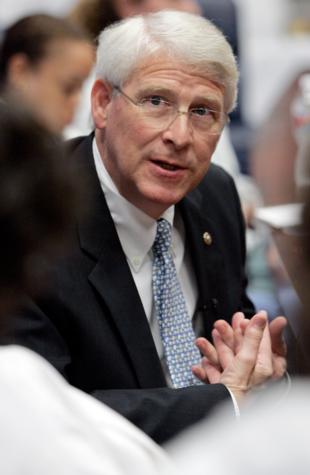
The Senate Committee on Commerce, Science, and Transportation Subcommittee on Communications, Technology, Innovation and the Internet held a hearing on Tuesday to examine the progress of FirstNet, the first nationwide, high-speed network dedicated to public safety.
Chairman of the Subcommittee Roger Wicker (R-MS) chaired the hearing, which was titled “FirstNet Oversight: An Update on the Status of the Public Safety Broadband Network.”
“Although FirstNet has made commendable progress in the past year, questions linger about the future viability of the network,” Wicker said. “I appreciate FirstNet’s commitment to providing our rural communities with the same services as larger, urban cities, but rural and remote coverage remains a major concern of mine.”
FirstNet was created by the Middle Class Tax Relief and Job Creation Act of 2012 following the urging of the public safety community to provide first responders with a network dedicated to public safety. The hearing examined FirstNet’s progress in meeting benchmarks; its cost of deployment, with a special focus on rural areas; and plans for FirstNet to become a self-funding entity.
“Tasked with building and operating the Nationwide Public Safety Broadband Network, the 2012 act allocated $7 billion from spectrum auction proceeds to launch FirstNet,” Wicker said. “The AWS-3 spectrum auction, which concluded in January 2015, raised the $7 billion needed to begin the planning and development stage.
“The cost of coverage and maintenance of the network in these hard-to-reach areas needs to be addressed on the front end of deployment. An accurate inventory of towers and equipment is critical to ensuring that infrastructure is capable of withstanding 200 mph winds during storms similar to Katrina.”
Wicker said that he recognized that nationwide deployment will not happen overnight and, to that end, FirstNet will review bids in the next several months to award a contract for all aspects of deployment.
As the network grows, Wicker added, it must have the sophistication to determine not only the technical capacity of those employing it but also have the ability to be monetized to keep it running in the future.
“The costs placed on public safety entities to use the network are also a major concern with regard to long-term sustainability,” Wicker said.
U.S. Sen. Bill Nelson (D-FL) added that FirstNet is currently at a critical juncture, with the network closer than ever to becoming a reality despite numerous questions remaining to be decided about how it will be run.
“When we came together in a bipartisan way more than four years ago to take the important step of creating FirstNet, it was because we knew we needed to give our nation’s first responders – who put their lives on the line each and every day – the tools they need to communicate effectively during emergencies,” Nelson said. “Governors, mayors and public safety officials from across the country all joined us to put aside individual parochial concerns and recognize that we all had to work as partners to create a new paradigm if we were to make a truly interoperable network for first responders a reality.
“As it’s taken several years to get to the RFP (request for proposals) stage, that collective will in support of FirstNet may have faded into skepticism in some corners. I fear that some may try to exploit such feelings at the expense of our nation’s first responders. Now is not the time to jump to conclusions or make rash decisions with regard to FirstNet. The process Congress created is working and we will soon know the parameters of the private sector’s response to the RFP.”
FirstNet CEO Michael Poth, calling FirstNet’s goal of enabling the deployment of the network “a matter of critical importance for public safety,” said that much has been accomplished but that each new step reveals new challenges.
“Since our inception, FirstNet has taken the necessary steps to build an organization, execute a vigorous consultation and outreach strategy, develop and produce a comprehensive request for proposals, and lay the groundwork for a successful deployment of the (Nationwide Public Safety Broadband Network),” Poth said. “The past three years have involved thousands of working hours to solve the various challenges FirstNet has faced. I am proud to say that today we have an organization of people who are dedicated to public safety and to fulfilling our mission, a culture of hard work, openness, and transparency, a procurement strategy that we believe is attractive to the vendor community and will lead to a successful public-private agreement, and a robust consultation and outreach program to educate, inform and obtain input from our stakeholders.
“With these accomplishments, we have sowed the seeds of success as FirstNet strives to develop the public safety broadband market here in the United States and to influence public safety around the world.”




